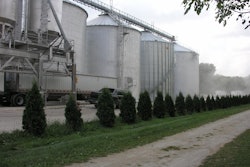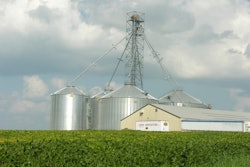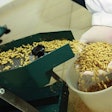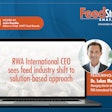It's a tough time in agriculture right now. It's a mature market place — one wrought by unpredictability — and in the words of Alan Wessler, vice president of MFA’s feed division, "they're not making more land and they're not growing more producers." Competition is stiff. To combat the forces beyond its control, MFA Inc. has made it mission to make customer service part of its culture; and after 96 years, MFA Inc. has garnered quite a reputation for accomplishing this feat.
"When you know people are counting on you to provide a quality product at a competitive price, it translates into a culture of accountability — and we've got a history of service," Wessler says. "Our relationship with the producer is reciprocal: They allow us to stay competitive in our market while we stay competitive in ours. We know that if the animals perform well on our products, and it enhances the producers bottom line, more than likely he'll be back to do business again."
“We've been around awhile, people know we're going to be there,” explains Wessler.
MFA Incorporated’s origins trace back to a one-room schoolhouse near Brunswick, MO. In 1914 seven area farmers met at the schoolhouse to discuss an article William Hirth wrote for the Missouri Farmer and Breeder discussing the formation of farm clubs. From conversation spurred the formation of the Missouri Farmers Association, a cooperative that eventually grew to become the largest business enterprise in the state.
Today, the MFA co-op is owned by more than 45,000 farmers and ranchers in Missouri and surrounding states. The member-owned cooperative’s clientele is comprised of a mix of grain and livestock producers. The co-op’s members pick and choose the services they utilize, and MFA strives to meet all of these varied needs by operating as a full-line, full-service agribusiness.
MFA operates under the principle of "the extra degree," Wessler explains: "The thinking behind this theme is this: At 211 degrees water does not boil, but it will if you go that extra degree. You produce steam, and once steam is harnessed it is incredibly powerful. We go that extra degree."
For example, he says, it could be as simple as a farmer realizing he's going to run out of feed on a weekend, the MFA employees will find ways to get that person taken care of until the mill opens or open it back up on a Saturday so he can get the feed he needs.
According to the company, “MFA Incorporated combines the principles of an established cooperative with the market savvy of an aggressive agribusiness.” This manifests itself in the co-ops focus on establishing businesses, organizations and other cooperatives to aid and strengthen the position of agriculture. MFA offerings include: feed production, sales and distribution; plant food sales and distribution; seed and crop protection sales and distribution; farm supply sales and distribution; custom application and site-specific services; financing services; and livestock and grain marketing.
MFA’s core businesses include 106 MFA Agri Services Centers, as well as some 50 affiliates and a wide network of local, independent cooperatives and dealers; the combination of these businesses, subsidiaries and joint ventures delivers $750 million in sales annually.
Since Missouri is the number three cow/calf state in country — and feed/animal health business that goes with it — feed is an important part of the MFA offerings. Wessler notes the cyclical nature of animal nutrition, health and management: “All three of these components need to work well for the animals to perform as well as they are genetically capable of.”
Wessler explains: “From a manufacturing standpoint, the nutrition you put in front of them is only as good as the formulation, and the manufacturing process allows you to capture. Make sure you’re mixing well, the bags seal tight and all the little things go together in order for the nutrition the producer buys works for the animal. The goal is to make sure the customer has what he needs – whether health or nutrition — to allow his animals to express the mostly they are capable of while staying healthy.”
MFA operates six major wholesale Missouri feed mills located in Aurora, Lebonon, Gerald, Kirksville, Mexico and St. Joseph; and an additional six manufacturing outlets at retail mills.
While the co-op has nearly a century of experience to draw from, it strives to stay ahead of the times by embracing a progressive stance on the adoption of new technologies in order to keep costs low and deliver quality product on tight turnarounds.
Inside the Mexico feedmill
Located amidst the rolling hills and plains of central Midwest, MFA Incorporated’s Mexico, MO-based feedmill honors its long tradition of serving its varied clientele of farmers and ranchers while embracing the technology that will keep it competitive into the future. Its dedication to delivering value to the customer through efficient business operations is illustrated by the capital investments the co-op has made in its Mexico, MO-based feedmill.
The plant opened for manufacturing in the early 1960s, and offers the full-line feed manufacturing of both MFA’s branded products and custom feeds. The production of custom products makes up 20% of the mills capacity. Notably, it is the sole supplier of mineral products to the MFA system.
The feedmill produces an annual volume 30,000 tons.
The mill is flexible enough to be capable of putting together a ration if the customers needs are different than what the branded formulations offer.
“We will design and manufacture feeds to meet the specific nutritional requirements for the species,” Staudt says. “Since we serve every store in the state as a customer our turnarounds can be pretty demanding.”
The Mexico plant has 11 employees: eight hourly, two supervisors and one secretary.
Often times, the MFA staff is given 48 hours to produce short-order batches. Operating with set crews, the facility operates in shifts ranging from 6 to 12 hours.
The Mexico facility’s central location has made it a distribution hub. In the past this fact, matched with customer demand, put a strain on the facility’s efficiency — at least until the plant began making a move toward improving its operations with the inception of a two-phase manufacturing improvement program.
Investment in innovation
“The upgrades in this mill revolved around inefficiencies we felt were costing us time and money,” Wessler explains.
The first step in MFA’s journey toward improvement began with the addition of robotic unloading set up.
The robot stacks 16 to 18 bags/minute. Aside offering speed and concise stacking ability – one that saves space in the warehouse — MFA has experience residual benefits from the robotic packaging system.
“What is intangible is the number of projected workers compensation related injuries we’re not dealing with because of reduced operators having to handle 50-lbs bags,” Staudt explains. “We would expect a reduction in the strains related to handling 50-lbs. bags.”
The installation of the bagging system is the final step in a greater improvement program.
Feedmill veteran Tom Staudt was charged with the task of identifying the proper machinery to get the job done. Staudt first saw the Bratney/Premier Tech Systems bagging system, featuring an automated bag-top reformer, at the IPE/IFE show in Atlanta in 2006.
After seeking the system in action, Staudt broke down the cost benefit of the system to get MFA's approval for the investment — specifically, the cost benefit's promise to reduce plant labor, added labor efficiency grain, a reduction in overall shrink and the lose related to packaging, and an increased throughput rate.
Once the numbers were reviewed, the company chose to move ahead with the purchase and installation of the system.
“We were looking for something that would speed things up, that would cause the operation to run smoother, that would compliment robotic stacker system we already had in place,” Wessler explains. “We needed a unit that could take the wear and tear that happens in the working environment of a feedmill — this was the guiding premise we had in mind when looking at we needed to get done.”
Prior to the new bagging system, MFA has two packing lines running simultaneously: a valve packaging line for minerals, and an open-mouth sewn packaging line for pelleted and meal products. Combined, the two lines could output 70/ton a shift. Knowing these numbers could be improved, the company sought to combine both packaging processes into one system.
The purchase has since paid off. Since the system was installed in December 2009, it has improved three main production issues. The company has increased daily throughput output by 20%. In addition to the increases in volume, the new system reduced the company’s labor by 50% on the packaging line; the overall operation’s labor requirements for the mill were reduced 33%.
"Once [management] saw the improvement in the operation — in regards to efficient use of resources — we were very please," Wessler says.
The packaging system is rated for 20/bags a minute, but on average, the entire system moves 17 to 18 bags per minute depending on the product. [How many tons a shift?] In the future, it she company is aiming for 100/ton a shift.
“Our ability to meet the 48-hour notice has greatly improved, and we are able to meet this window with certain product lines,” Staudt explains. “We push four major product lines in this facility, the new equipment helped make it not an issue that it was now.”
Here’s how it works: Empty bags are placed onto a conveyor and are indexed into the bag hanging device. The bag hanging device hangs the bag on the discharge spout, and the feed is pre-weighed on a duplex scale up above the discharge spout. When the feed is weighed and the bag is presented to the discharge spout then the feed is discharged from the scales and then it drops into the bag. Once that is accomplished, then the bag is released from the discharge spout and it travels down the bagging conveyor. At this point, a TagMaster tagging system applies a tag to the bag and it goes though a cut, tape and sew sewing machine to seal the bag. After this step, it exits the bagging conveyor and heads over to the automated, robotic stacking system. At this point, bags are presented to the warehouse.
The system features automatic gusset reforming on the spout; it hangs paper and laminated poly woven bags; and allows for a turnkey design/engineering and installation services. The system can changeover in three minutes.
“This piece of equipment has enhanced our competitiveness and our ability to service our customers on a timely basis with good product,” Wessler says.
As the demand for food and feed products increases we'll be looking at automating other mills to enhance their efficiency, Wessler says. If the co-op sees a potential return that justifies the investment in technology, MFA will make it.
“Technology enhances your competitiveness,” Wessler says. “As other costs tend to go up, you need to find ways to minimize expenses where you can and improve efficiencies so it’s the on-going intention of the division to continue to improve.”


















